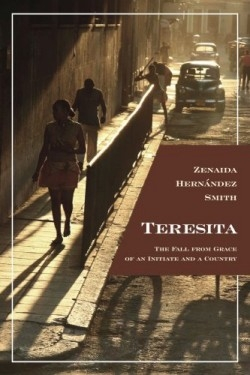Teresita
The Fall From Grace of an Initiate and a Country
Teresita tracks the very different arcs of two Cuban women who must make their way in the United States the static threat of Castroism never far from their thoughts. Fernanda is a fiercely independent journalist who refuses to adapt to communism when Batista is overthrown opting to chance it elsewhere. Indeed a mass exodus is underway as private property is confiscated as soldiers round up thousands of landowners managers and political opponents. Plenty of jobs await in Florida — educated Cubans are welcome to clean pretty much any house but are not wanted for skilled positions. Fernanda pushes herself to master English quickly and works hard to bring other family members to America.
Fernanda’s niece Flor Teresa known to all as Teresita is a teenager as the novel opens. She’s committed to direct struggle in Cuba and resists emigrating even as the men in her family are carted away following the Bay of Pigs. She feels a calling to become a nun but also plants explosives and smuggles fugitives out of Havana. A mixture of bravery and weakness makes her a vulnerable target for brainwashing by a cultish priest and malevolent politicos. Fernanda flies into New York from LA or Boston to make saves as Teresita moves “out of one bad situation only to bump into another and another.” A lifelong professional focus on the plight of impoverished children links to a child-like naiveté concerning the motivations of others which persists into her thirties. Short poems at the beginnings of chapters serve as a barometer of Teresa’s state of mind.
Enmeshed in a radical action group known as The People’s Movement she signs Daily World bylines without reading the ghosted articles. The division muddles between socialist causes which Teresita supports and communism proper. “Communists deny God yet claimed their ambition was to end pain and poverty. She shared that ambition but differed in the means to achieve the end.” Complications develop when Teresita insists on visiting Cuba travel restricted by the American government. A paternal FBI agent arranges an exception but the price is an on-going agreement to inform on associates. Havana after a decade away is a place of ancient automobiles and constant propaganda rallies.
Teresita’s poorly placed trust contributes substantially to the antagonistic strength of outside forces resulting in doses of agony which should have been avoidable. Her emotions hopes and desires are fully explored but analytic thought processes are more implied than explicit. Resistance to wising up is partly attributable to abuse and dislocation but the remaining cause is unknown. Conversely Fernanda is complete and understandable even though certain portions of her life are summarized.
Zenaida Hernández Smith left Cuba in 1959 after working as an art critic and a newspaper writer. She’s currently busy fine-tuning a memoir and a biography from her Florida home. This novel’s questions of loyalty and blocked goals play out with poignancy as the Castro Revolution’s continuing effects on exiled Cubans goes under the microscope.
Disclosure: This article is not an endorsement, but a review. The publisher of this book provided free copies of the book and paid a small fee to have their book reviewed by a professional reviewer. Foreword Reviews and Clarion Reviews make no guarantee that the publisher will receive a positive review. Foreword Magazine, Inc. is disclosing this in accordance with the Federal Trade Commission’s 16 CFR, Part 255.


